#conspiracy theories
Text

Welp, guess who's convinced of a red thread between this episode and escape the greenroom
Sam Reich what is going on in that evil little brain of yours...
79 notes
·
View notes
Text
How a New Age conspiracy theorist dishonestly cited a CIA file as "evidence" of starseeds and alien contact
So I recently came upon a video claiming that the CIA knows all about starseeds. The creator of this video cited a document found in the Freedom of Information Act Electronic Reading Room.
The document this man cited was titled "Star People Visit Earth To Spread Peace Message." So I went to the website and looked it up. (You can read it for yourself here.)
Opening up the document, we can see what it is for ourselves: a newspaper article clipped from the May 2, 1983 issue of Arizona Daily Wildcat. The article is reporting on claims made by a couple of New Agers, Michael and Aurora El-Legion. Literally everything this article says about aliens and star people came from these two people who gave a presentation at the University of Arizona. Everything they're quoted as claiming in this article was all pretty standard fare among New Agers at the time.
For anyone who isn't aware, the CIA collects information on all kinds of things that might be of interest. It doesn't mean that these things are necessarily real, just that they think it's worth looking into. The only thing this document proves is that someone working for the CIA cut an article out of a newspaper and filed it away.
#new age#new agers#starseed#starseeds#star people#aliens#conspiracy theory#conspiracy theories#conspiracism#conspiratorial thinking#conspirituality
15 notes
·
View notes
Text


fell for the oldest trick in the book
34K notes
·
View notes
Text
So there's this Flat Earther who said he was traveling to the Ice Wall last September to prove the Earth was flat. He has not posted since.
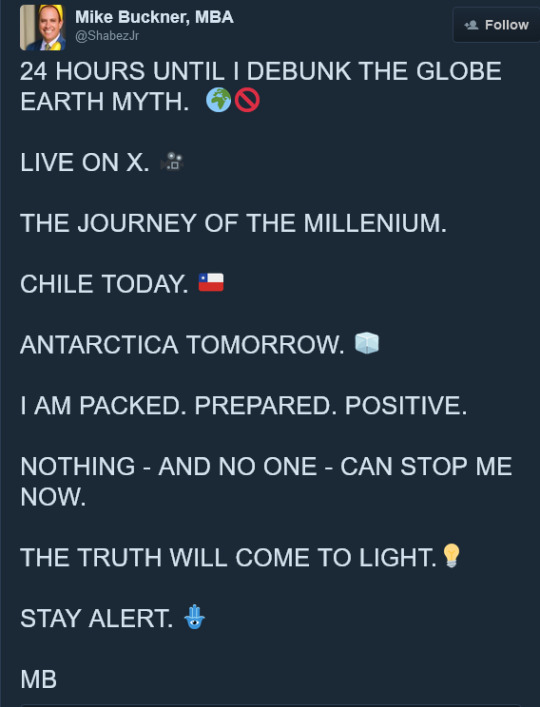
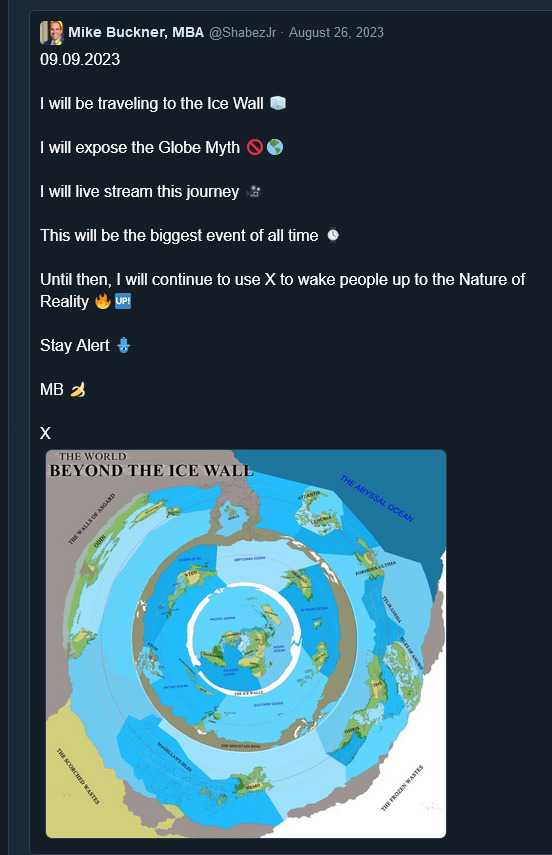
Here are some theories on his current whereabouts:
He fell off
Too busy partying on the continent of Geminia to post anymore
He discovered a second, bigger ice wall
He died alone in the frigid wastes of Antarctica, aware at last of his folly as he slowly, painfully expired, his body never again to be seen by human eyes
Here be dragons (they ate him)
22K notes
·
View notes
Text
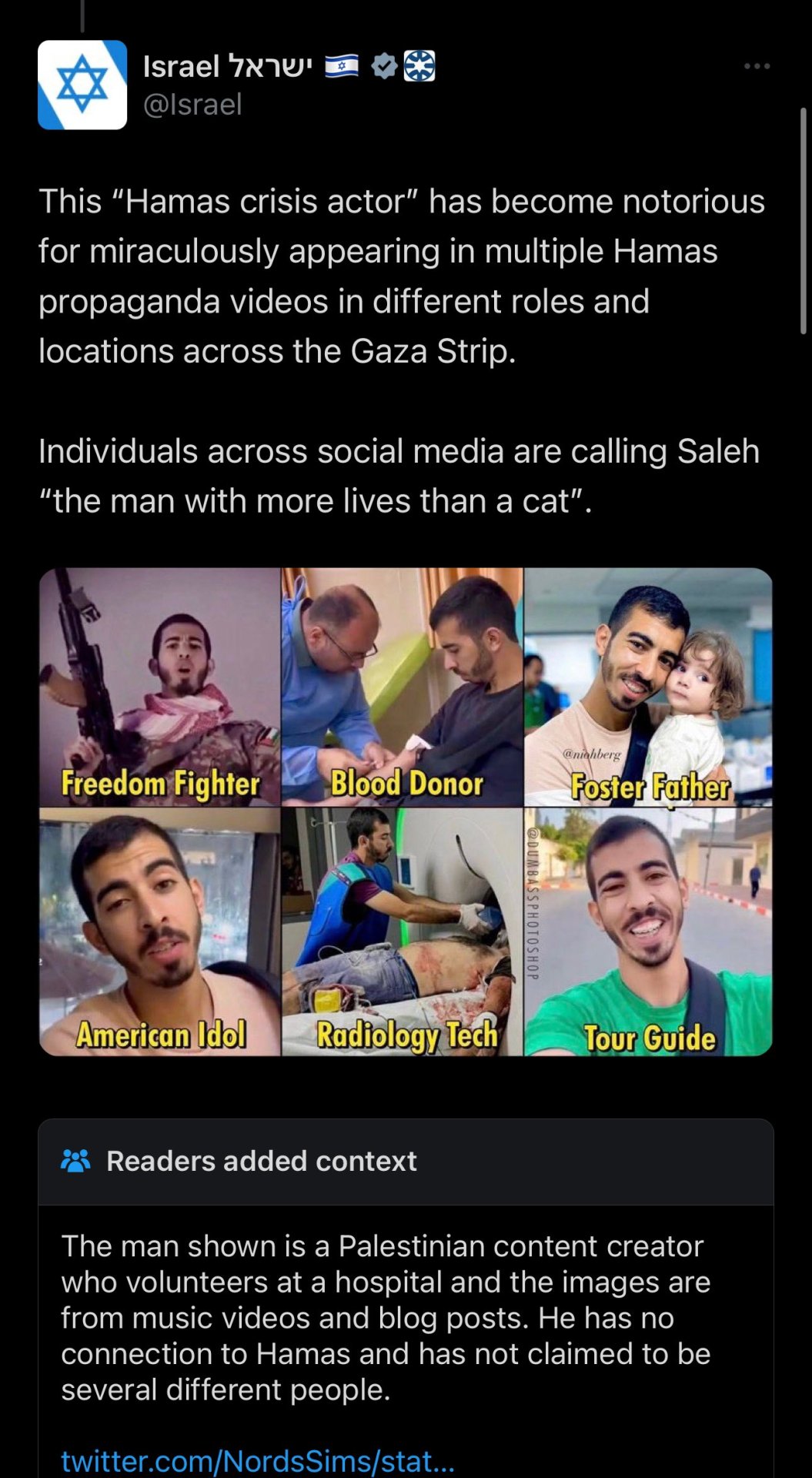
Something unremittingly bleak about a goddamn country starting "crisis actor" conspiracy theories to deny their crimes. A term invented to deny the deaths of children at Sandy Hook in 2012 is now used to deny the deaths of children in Gaza in 2023.
As the community note says, this isn't a crisis actor. This is a guy who posts on Instagram. A influencer who posts videos online of breaking events...is seen at a lot of breaking events. To Israel, this is a sign of a conspiracy. In fact, some of those images aren't even him, or aren't even related to Palestine at all; one image included in other posts targeting Saleh Aljafarawi is a Halloween costume from Thailand. That article says "pro-Israeli accounts" tweeted this, but it's the literal, official Twitter account of Israel posting this shit, next to their comedy sketches that somehow make trans people the punchline bc fascists only have one joke the whole world wide I guess
Like. It's not new for a government to deny the reality of its atrocities. It is new for that government to outright use a conspiracy theory term devised by Alex fucking Jones, or to, when called on doing so, defend it as a "meme" (also bizarre to see hardcore Zionists use a term crafted for especially antisemitic conspiracy theories). Everything rancid about the world in 2023 congealed into a single tweet, right here
17K notes
·
View notes
Text
while pete buttigieg states the extremely obvious about how “bridges arent built to withstand container ships hitting them” and would like you to believe that these things just randomly tragically happen, the actual takeaway is that horrible accidents are more likely when companies ignore safety regulations and have little regard for their workers lives or labor laws and value profit more
#between the batshit conspiracy theories about the bridge collapse and people trying to naturalize something that happens#mostly because of negligence and not just randomly for no reason#mine
8K notes
·
View notes
Text

7K notes
·
View notes
Text
Check your conspiracy theory. Does it sound anything like this?
There is an ancient global conspiracy plotting to create a one world government.
The one world government will be headed by a single leader.
The conspiracy intends to make everyone follow a religion it created.
The conspiracy is trying to destroy all true religion/spirituality.
The conspiracy deliberately stirs up conflict and starts wars.
The conspiracy deliberately does whatever it can to confuse, exhaust, and demoralize the people.
The conspiracy creates and/or manipulates art and entertainment to control and brainwash the masses.
The conspiracy uses mind-altering substances to manipulate and control people.
Liberal politics (EG, religious tolerance, equality) are part of the conspiracy.
Communism and collectivism are part of the conspiracy.
The conspiracy manipulates the economy to our detriment.
The conspiracy wants to do away with the gold standard.
The conspiracy wants to do away with the free market.
The conspiracy intends to tax the rich, which is bad because taxes are just legal theft.
Teaching people about the mistakes and atrocities committed by governments is part of the conspiracy.
The conspiracy creates new religions and spiritual movements to further their agendas.
All secret societies (EG, Freemasonry) are part of the conspiracy.
Presidents are manipulated puppets of the conspiracy.
The conspiracy manipulates anyone with a high political position.
The conspiracy grooms world leaders.
Agents of the conspiracy are planted everywhere, in all levels of society.
The conspiracy kills anyone who might expose their plans in ways that no one would suspect are actually murder.
The conspiracy follows/uses the Kabbalah.
Literally all of these were claimed in The Protocols of the Learned Elders of Zion, an antisemitic hoax used by the Okhrana to justify violence against Russian Jews. It was used by Nazi Germany to justify the Holocaust, and today it still serves as the blueprint for most conspiracy theories - even if modern conspiracy theorists try to hide it, downplay it, or rationalize it with another, equally absurd conspiracy theory.
#conspiracy theory#conspiracy theories#conspiracism#nwo#new world order#one world government#antisemitism#the protocols of the learned elders of zion#illuminati#the illuminati#great reset#the great reset
8K notes
·
View notes
Text
This flag is one of the most Weird American Things I can think of

It's the POW/MIA flag. It's flown over the White House, alongside the American flag, since the 80s (off and on). As of 2019 it's mandatory to fly it over federal government buildings; it flies over state government buildings in many places as well. It seems like a neutral sign of military support, so it's easy to pass over it without asking "wait, are there any American POWs"
Then if you look it up it's the symbol of a Vietnam-era conspiracy theory debunked in 1993. This is the flag for the 70s/80s version of Pizzagate, and it flies over the US Capitol building and White House every single day
7K notes
·
View notes
Text
There was a teen in the cave.
A teen no one knows and looks like he could be a wayne, stands in the cave.
"Actually, I'm a wayne." He says with a shrug.
Bruce, Batman, carefully thinks of the implication.
"Not yet," The teen, Danny, doesn't say anything. Simple smiles. "You're not a wayne, yet. You will be. But not yet."
Then Bruce sighs, dropping the batman mask in order to take in the teen.
"Does future me know of the time travel?"
Dannys smile grows into a grin, deciding to take pity on the man. "You, grandbat, have..." He makes a vague gesture. "Theories, which none of your children ever confirmed."
The bat's mind short-circuits at the choice of words
Dick is sputtering incomprehensibly, there are Baffled expression all around.
Because.
Because that child isn't Bruce's, but one of theirs.
"Who is it?" Jason demands, hand clenching his gun uselessly.
Danny continues to smile, a hint of mischief now peeking out.
The cave is filled with theories, some yell, some sob, yet all eyes leave danny.
All but one pair.
She had known the moment his body language switched just enough for her to read.
She had known the moment he disappeared before the clan.
Had known when his hand found hers, shoulders bumping.
Her heart clenches, throat dry and memories of her childhood flooding to mind.
So she asks, voice soft and hesitant.
"Am I a good mother?"
And danny looks up at cass, adoration and pride laid out plain for her to see and accept.
"You're the best."
And so they both watch the clan together, silent and comfortable.
(Cass doesn't question when she finds him, how and why. All she knows is that she's more attentive when out on patrol, looking and waiting.)
(This is how Cassandra Cain-Wayne returns one night from patrol, a child, barely out of toddler stage and clinging to her form.)
(This is how the Batclan officially meets one Daniel James Cain-Wayne, freshly washed and clothed, a cookie in hand and hiding shyly behind Cass.)
(When they meet, all they say is "Welcome home, danny," and "Good to see you again.", Danny doesn't necessarily get it, but that's okay. Maybe his new mom will explain it one day when he's bigger.)
#dcxdp#dp x dc crossover#dpxdc#fic prompt#writing prompt#dc x dp prompt#cassandra cain is dannys mom#time travel shenanigans lead to conspiracy theories#half of the batclan think jason is the dad#or dick#damian and tim are outruled just bc age and tim denying it with no one protesting#alfred knows#danny moves like cass#he gave them both a cookie in the shadows#danny won him over by calling him great grand bat#he tells him of all the mischief they got up to bc no one would believe the baby had alfie wrapped around his finger like that#theyre just in denial#theyre all wrapped around the finger#danny “i mastered how to wrpaonize my cuteness” cain-wayne
4K notes
·
View notes
Text

Conspiracy Theory Book Club.
(My latest cartoon for Guardian Books).
2K notes
·
View notes
Text
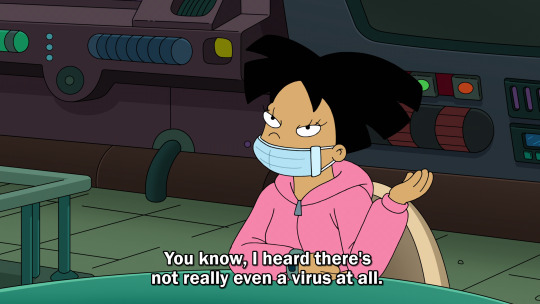
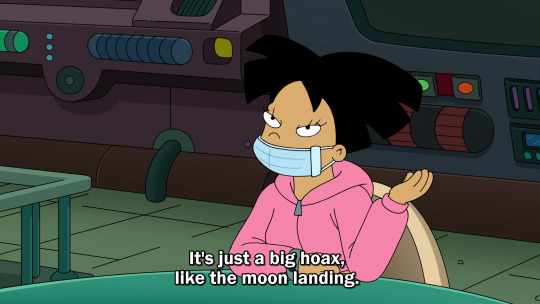
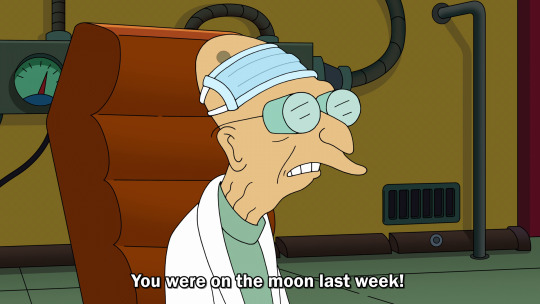

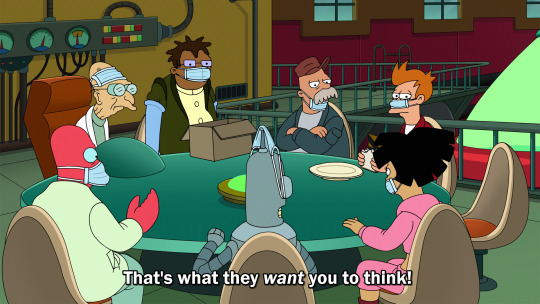
#futurama#futurama season 11#rage against the vaccine#amy wong#professor hubert farnsworth#conspiracy theories
2K notes
·
View notes
Text
Priority time, folks: TikTok witches being kinda shallow with their craft is a threat to no one. TikTok witches spreading recycled Satanic Panic/NWO conspiracy theories is a threat to everyone.
7K notes
·
View notes
Text
The fandom echo chamber: fanon, microanalysis and conspiracy brain
As someone who has been in fandom spaces, on and off, for 20 years, I find some fascinating trends popping up in the last decade that I thought to be fandom-specific but clearly aren’t. So, I would like to do a little examination of where those things come from, how they are engaged with, and what it says about the way we consume media. This is a think piece, of sorts, with my brain being the main source. As such, we will spend some time down the memory lane of a fandom-focused millennial.
This is largely brought about by Good Omens. But it’s also not really about Good Omens at all.
Part one. Fanon.
The way we see characters in any story is always skewed by our very selves. This is a neutral statement, and it does not have a value judgement. It’s simply unavoidable. We recognise aspects of them, love aspects of them, and choose aspects of them to highlight based entirely on our own vision of the universe.
Recognition comes into this. There is a reason so many protagonists of romance novels have a “blank slate” problem. Even when they do not, we love characters who are like us or versions of us that we would like to be. And when we say “we”, I also mean, “me”.
(I remember very clearly this realisation hit me after a whole season of Doctor Who with writing which I hated utterly when I questioned why I still clung so incredibly hard to Clara Oswald as my favourite companion. Then I looked at myself in the mirror. Oh. Well. That would do it, wouldn’t it?)
Then, there is projection, and, again, this is a neutral statement. Projection exists, and it is completely normal and, dare I say it, valid way of engaging with — well, anything. Is the character queer? Trans? Neurodivergent? Are they in love? Do they like chocolate? Are they a cat person? Well, yes, if this is what the text says, but if the text does not say anything… You tell me. Please, do tell me. Because, in that moment of projection, they are yours.
And then, there is fandom osmosis, and that is the most fascinating one of them all, the one that is not very easy to note while you are inside the echo chamber. It’s the way we collectively, consciously or not, make decisions on who or what the characters are, what their relationships are, and what happens to them.
(Back when I was writing egregiously long Guardian recaps on this blog I actually asked if Shen Wei’s power being learning actually was stated anywhere in the canon of the show. Because I had no idea. I have read and reread dozen of fanfics where that is the case, and at some point through enough repetition, it became reality.)
We are all kind of making our own reality here, aren’t we?
Back when things were happening in a much less centralised manner - in closed livejournal groups, and forums of all shapes and sizes - I don’t remember there being quite as much universally agreed upon fanon. Frankly, I don’t remember much of universally agreed upon anything. But now, everything is in one place: we have this, and we have AO3, and it’s wonderful, it really is so much easier to navigate, but it’s also one gigantic reality-shifting echo chamber, with blogs, reblogs, trends, and rituals.
Accessibility plays its part, too. If you were, say, in Life on Mars (UK) fandom between seasons, and you wanted to post your speculation fic, you had to have had an account, and then find and gain access to one of the bigger groups (lifein1973 was my poison, but ymmv), and then, if you feel brave you may post it, but also, you may want to do so from your alt account if you wanted to keep yours separate, and then you would have to go through the whole process again. And I’m not saying that fan creations then were somehow inherently better for it than fan creations now (although Life on Mars Hiatus Era is perhaps a bad example - because some of the Speculation Fic there was breathtaking), but there is something to say about the ease of access that made the fandoms go through a big bang of sorts.
(I mean, come on, I can just come here and post this - and I am certain people will read it, and this blog is a pandemic cope baby about Chinese television for goodness sake.)
The canon transformations that happen in the fandom echo chamber truly are fascinating to witness as someone who is more or less a fandom butterfly. I get into something, float around for a bit, then get into something else and move on. I might come back eventually when the need arises, but I don’t sustain a hiatus mind-state. This means that when I float away and return, I find some very intriguing stuff.
Let’s actually look at Good Omens here. Season two aired, and I found it spectacular in its cosy and anguished way; deliberately and intelligently fanfic-y in its plot building; simple but subversive, and so very tender. (I will have to circle back to this eventually, because, truly, I love how deliberately it takes the tropes and shatters them - it’s glorious). And, to me - a person who read the book, watched the first season, hung around AO3 for a few weeks and moved on - absolutely on-point in terms of characterisation.
So imagine my surprise when the fandom disagreed so vehemently that there are actual multi-tiered theories on how characters were not in possession of their senses. Nothing there, in my mind, ever contradicted any of the stated text, as it stood. This remained a strange little mystery until I did what I always do when I flutter close to an ongoing fandom.
I loaded AO3 and sorted the existing fic by popularity. And there it was, all there: the actual earth-shattering mutual devotion of the angel and the demon; willingness to Fall; openness and long heart-aching confession speeches. There was all of the fanon surrounding Aziraphale and Crowley, which, to me, read as out of character, and to one for whom they became the reality over the last four years, read as truth.
Again, only neutral statements here. This is not a bad thing, and neither this is a good thing, this is just something that happens, after a while, especially when there are years for the fandom-born ideas to bounce around and stew. I can’t help but think that so much of what we see as real in spaces such as this one is a chimaera of the actual source and all the collective fan additions which had time and space to grow, change, develop, and inspire, reverberating over and over again, until the echoes fill the entirety of the space.
Eventually, this chimaera becomes a reality.
Part two. Microanalysis
Here are my two suppositions on the matter:
1. Some writers really love breadcrumb storytelling.
Russel T Davies, for instance, on his run of Doctor Who (and, if you are reading it much later - I do mean the original one), loved that technique for his seasonal arcs. What is a Bad Wolf? Who is Harold Saxon? Well, you can watch very very carefully, make a theory, and see it proven right or wrong by the end of the season.
Naturally, mystery box writers are all about breadcrumb storytelling: your Losts and your Westworlds are all about giving you snippets to get your brain firing, almost challenging you to figure things out just ahead of the reveal.
2. We, as humans, love breadcrumbs.
And why wouldn’t we? Breadcrumbs are delicious. They are, however, a seasoning, or a coating. They are not the meal.
Too much metaphor?
Let’s unpack it and start from the beginning.
Pattern recognition colours every aspect of our lives, and it colours the way we view art to a great extent. I think we truly underestimate how much it’s influenced by our lived experiences.
If you are, broadly speaking, living somewhere in Western/North-Western Europe in the 14th century, and you see a painting in which there is a very very large figure surrounded by some smaller figures and holding really tiny figures, you may know absolutely nothing about who those figures are, but you know that the big figure is the Important One, and the small ones are Less Important Ones, and the tiny ones are In Their Care. You know where your reverence would lie, looking at this picture. And, I imagine, as someone living in the 14th century, you may be inspired to a sense of awe looking at this composition, because in the world you live in, this is how art works.
If you, on the other hand, watch a piece of recorded media and see the eyes of two characters meet as the violins swell, you know what you are being told at that moment. You don’t have to have a film degree to feel a sort of way when you see a green-tinged pallet used, when cross-cuts use juxtaposing images, or notice where your focus is pulled in any given shot. This stuff - this recognition of patterns - has been trained into us by the simple fact that we live in this time, on this planet, and we have been doing so long enough to have engaged recorded media for a period of time.
As humans, we notice things. Our brains flare up when they see something they recognise, and then we seek to find other similar details and form a bigger picture. This often happens unconsciously, but sometimes it does not. Sometimes we do it on purpose: finding breadcrumbs in stories is a little bit like solving a mystery. It allows us to stretch that brain muscle that puts two and two together. It makes us feel clever.
So yes, we love breadcrumbs, and, frankly, quite a lot of storytelling takes advantage of this. It’s very useful for foreshadowing, creating thematic coherence, or introducing narrative parallels and complexity. It’s useful for nudging the viewer into one or the other emotional direction, or to cue them into what will happen in the next moment, or what exactly is the one important detail they should pay attention to.
Because this is something media does intentionally, and something we pick up both consciously and not, it is very hard to know when to stop. We don't really ever know when all of the breadcrumbs have been collected. It becomes very easy to get carried away. There is a very specific kind of pleasure in digging into content frame by frame, soundbite by soundbite, chasing that pleasure of finding.
But it is almost never breadcrumbs all the way down. They are techniques to help us focus on the main event: the story. I truly believe those who make media want it to reach the widest possible audience, and that includes all of us who like to watch every single thing ever created with our Media Analysis Goggles on and those who are just here to enjoy the twists and turns of the story at the pace offered to them. And I think, sometimes in our chase to collect and understand every little clue we forget that media is not made to just cater for us.
One can call it missing a forest for the trees. But I would hate to mix my metaphors, so let’s call it missing a schnitzel for the breadcrumbs.
Part three. The Conspiracy Brain.
If you are there with me, in the midst of the excited frenzy, chasing after all those delicious breadcrumbs, then patterns can grow, merge together, and become all-encompassing theories. Let’s call them conspiracy theories, even though this is not what they truly are.
So, why do we believe in conspiracy theories?
One, Because We Have Been Lied To.
All conspiracies start with distrust.
If you are in fandom spaces - especially if you are in fandom spaces which revolve around a queer fictional couple - especially-especially if you have been in such spaces for a period of time, you have most certainly been lied to at one point or another.
We don’t even have to talk about Sherlock - and let’s not do that - but do you remember Merlin? Because I remember Merlin. Specifically, I remember the publicity surrounding the first season, with its weaponised usage of “bromance” and assertions that this whole thing is a love story of sorts, and then the daunting realisation that this was all a stunt, deliberately orchestrated to gather viewership.
And, because we were lied to in such a deliberate manner for such an extensive period of time, I genuinely believe that it forever altered our pattern recognition habits, because what was this if not encouragement to read into things? Now we are trained to read between the lines or see little cries for help where they might not be. Because we were told, over and over again, that we should.
(Yes, I think we are all existing in these spaces coloured by the trauma of queer-bating. I am, however, looking forward to a world where I can unlearn all of that.)
Two, Cognitive Dissonance.
The chain reaction works a bit like this: the world is wrong - it can’t possibly be wrong by coincidence - this must be on purpose - someone is responsible for it.
Being Lied To is a preamble, but cognitive dissonance is where it all originates. In so many cross-fandom theories I have noticed a four-step process:
A) this is not good
B) this author could not have made a mistake
C) this must be done on purpose
D) here is why
(Funny thing is, I have been on the receiving end of the small conspiracy spiral, and it is a very interesting experience. Not relevant to this conversation is the fact that a lot of my job revolves around storytelling. What is relevant is that my hobbies also revolve around storytelling. And one of them is DnD. Now, imagine my genuine shock when one of the players I am currently writing a campaign for noticed a small detail that did not make a logical sense within the complexity of the world, and latched on to it as something clearly indicating some kind of a secret subplot. Their thinking process also went a bit like this: this detail is not a good piece of writing — this DM knows how to tell stories well — this is obviously there on purpose. It was not there on purpose. I created a clumsy shorthand. I erred, in that pesky manner humans tend to. And, seeing this entire thought process recited to me directly in the moment, I felt somewhere between flattered and mortified.)
This whole line of thinking, I think, exists on a knife’s edge between veneration and brutal criticism, relentlessly dissecting everything “wrong”, with a reverent “but this is deliberate” attached to it like a vice, because it is preferable to a simple conclusion that the author let you down, in one way or another.
Three, Intentionality
I believe that there is no right or wrong way of engaging with stories, regardless of their medium, and assuming no one gets hurt in the process. While in a strictly academic way, there is a “correct” way of reading (and reading into) media, we here are largely not academics but consumers; consumption is subjective.
However, this all changes when intentionality is ascribed.
The one I find particularly fascinating is the intentionality of “making it bad on purpose” because, as open-minded as I intend to always be, this just does not happen.
It certainly does not happen in long-form media. Even in the bread-crumb mystery box-type long-form media.
When television programs underdeliver, they also underperform, and then they get cancelled.
If all the elements of Westworld Season 4 that did not sit together in a completely satisfactory way were written deliberately as some sort of deconstruction for the final season to explore, then it failed because that final season will now never come.
(There will likely never be a Secret Fourth Episode.)
And look, I am not here to refute your theories. Creativity is fun, and theorising is fantastic.
But, perhaps, when the line of thought ventures into the “bad on purpose” territory, it could be recognised for what it is: disappointment and optimism, attempting to coexist in a single space. And I relate to that, I do, and I am sorry that there is even a need for this line of thinking. It’s always so incredibly disappointing that a creator you believed to be devoid of flaws makes something that does not hit in the way you hoped it would. It’s pretty heartbreaking.
Unfortunately, people make mistakes. We are all fallible that way.
Four, Wildfire.
Then, when the crumbs are found, a theory is crafted, and intentionality is ascribed, all that needs to happen is for it to catch on. And hey, what better place for it than this massive hollow funnel that we exist in, where thoughts, ideas and interpretations reverberate so much they become inextricable from the source material in collective consciousness.
Conspiracy theories create alternate realities, very much like we all do here.
So where are we now?
I am not here to tell you what is right and what is wrong; what is true, and what is not. We are all entitled to engage with anything we wish, in whichever way we wish to do it. This is not it, at all.
All I am saying is… listen.
Do you hear that echo?
I do.
#fandom thoughts#fanon#good omens#good omens 2#bbc sherlock#merlin bbc#think piece#it's been years and I still have no idea how to tag#conspiracy theories#fandom content#all fandoms
2K notes
·
View notes

